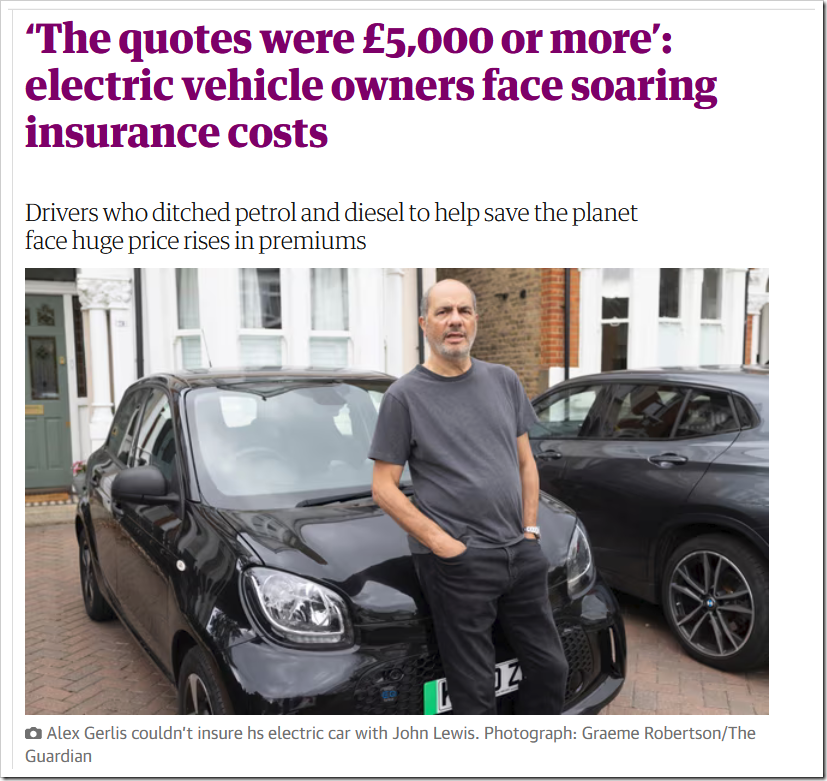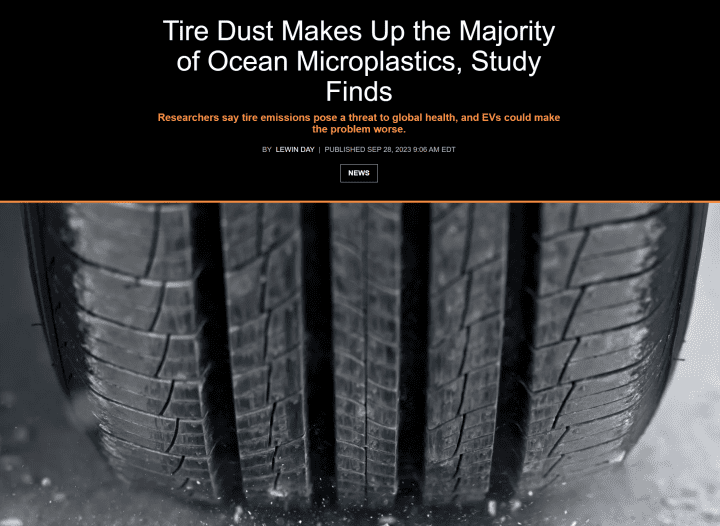Just when we thought we had a grip on the major culprits of pollution, a new villain emerges from the shadows. And this time, it’s not the ominous black smoke billowing from exhaust pipes or the industrial chimneys spewing toxins into the atmosphere. No, it’s something far more inconspicuous, yet equally, if not more, detrimental: tire dust.
A recent article from The Drive sheds light on a rather overlooked aspect of vehicular pollution. While the world has been fixated on tailpipe emissions, a silent perpetrator has been wreaking havoc, largely unnoticed. The article states,
“Scientists have a good understanding of engine emissions, which typically consist of unburnt fuel, oxides of carbon and nitrogen, and particulate matter related to combustion. However, new research shared by Yale Environment 360 indicates that there may be a whole host of toxic chemicals being shed from tires and brakes that have been largely ignored until now.”
Ah, the irony! As the world clamors for electric vehicles (EVs) as the saviors of our environment, it seems we’ve missed a crucial detail. The article goes on to reveal, emphasis mine,
“It’s an emissions problem that won’t go away with the transition to EVs, either. According to data from Emissions Analytics, EVs tend to shed around 20 percent more from their tires due to their higher weight and high torque compared to traditional internal combustion engine-powered vehicles.“
So, while EVs might not have tailpipe emissions, they’re not exactly the pristine, green machines they’re touted to be. The heavier weight of EVs, thanks to their bulky batteries, means they wear out their tires faster, releasing even more of these harmful particulates into the environment. A classic case of the road to hell is paved with good intentions, all puns intended.
But let’s delve deeper into the implications of this tire dust. The article cites a report from the Pew Charitable Trust which found that a staggering
“78 percent of ocean microplastics are from synthetic tire rubber.”
These toxic particles often end up ingested by marine animals, leading to
“neurological effects, behavioral changes, and abnormal growth.”
It’s not just the oceans that are at risk. The particles are so minuscule that they can pass directly through our lungs and into our bloodstream, even crossing the blood-brain barrier.
While there’s been a relentless push for recycling and reducing plastic waste to save the oceans, the real elephant in the room has been the cars we drive daily. On one hand, we’re told to reduce, reuse, recycle, and on the other, we’re sold the dream of ‘clean’ electric vehicles, which, as it turns out, are making problem worse.
The article also touches upon the challenges of studying these particulate emissions. Unlike tailpipe emissions, which can be easily captured and studied, understanding the full impact of tire and brake dust requires a more nuanced approach. But as the saying goes, where there’s smoke, there’s fire. And the initial findings are alarming enough to warrant immediate attention.
The revelations from this article serve as a stark reminder that environmental issues are complex and multifaceted. Simplistic solutions, like the blind push for EVs, often miss the mark. It’s high time we adopt a more holistic approach to environmental conservation, one that takes into account all aspects of pollution, not just the ones that make for catchy headlines.
To the proponents of electric vehicles and the so-called ‘green revolution,’ I say this: It’s always wise to look before you leap. And in this case, it seems the leap towards EVs might just land us in a pile of tire dust. We told you so.

Tire Dust Makes Up the Majority of Ocean Microplastics, Study Finds


Willem Post
EV sticker is 1.5 times equivalent gasoline
EV insurance is 3 to 4 times equivalent gasoline
THE ADDITIONAL COST WIPES OUT ALL ENERGY COST SAVINGS, but the much higher monthly car payments remain for at least 8 years.
EV owners have soooo screwed themselves, because on an A-to-Z (MINE TO JUNKYARD/RECYCLING), lifetime basis, the LIFETIME CO2 of an EV is about the same as for an EQUIVALENT, EFFICIENT, GASOLINE CAR
If you live in dysfunctional, democrat-run Los Angelos and New York, infested with gangs that just walked over the border UNVETTED, the chance of having your EV stolen is less than for a gasoline car.
The reason is, wherever those people came from, they were not brainwashed about the wonders of EVs and they likely never heard of Net Zero by 2050.
OMG, they do not know what they are missing
It looks like the UK is very quickly abandoning its Net Zero targets, because the UK has finally realized those targets are totally unaffordable, such as building 36,000 MW of offshore wind turbines in the North Sea by 2030. That target is even more extreme than Biden's 30,000 MW of offshore by 2030.
US/UK 66,000 MW OF OFFSHORE WIND BY 2030; AN EXPENSIVE FANTASY
https://www.windtaskforce.org/profiles/blogs/biden-30-000-mw-of-off...
Oct 4, 2023